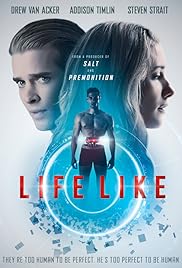We did it, kids! We’ve found a twist just about as ludicrous as that from Serenity! I don’t know whether to grab an ice cream cake or a goddamn shot o’ Jack. Maybe both. But, wait, I’m getting ahead of myself here.
So, remember a little while back when we talked about A.I. Rising? Well, I thought we were done with people misusing androids, but apparently we’ve got plenty of well-trod ground left to cover. Case in point: Life Like.

Here’s are setup: James has come into a fortune from his late father, inheriting a business of some sort and a house of ill-defined – though definitely rather large, I guess – size. He moves in with his wife, Sophie, who has some trouble adjusting to life with domestic servants. Ever the idealist, she lets the entire staff go (with plenty of future pay, don’t worry, kittens); she quickly learns, though, that the affairs of the house are too great to handle on her own. Apparently. So, in an attempt to find some common ground, James brings up the new-fangled idea of a robot valet. They pick one out from the dealer/inventor, a dryly slimy fellow dressed similarly to a Catholic priest, collar and all, who ensures them that their new helper is essentially a perfected form of humanity in every way and will only do that which pleases them. It’s not long at all, though, until Sophie, apparently feeling rather neglected, develops an attraction to Henry, their robot. Things escalate, with James acting decidedly territorially and cruelly toward Henry. As the marriage seemingly unravels, Henry exhibits the early signs of something deemed impossible by the aforementioned priest-lookin’ dude: feelings.
Right off the bat, I got some heavy flashbacks to A.I. Rising, particularly the evidently omnipresent message that mankind is doomed to fuck its mechanical servants, and it won’t even take very long! Part of the problem here, though, is that the sense of time and space is thoroughly warped due to poor storytelling. What feels like a matter of a handful of days for Sophie to basically fall in love with Henry (I need to remind you: an animate appliance with a human face on it) is revealed later to have taken place over the course of weeks or months. What!? There is no indication of substantial time passing whatsoever, so while the script understands what’s going on, we’re left to assume Sophie’s got something of a screw loose. James doesn’t fare much better, as he spends his days dealing with his father’s business, which is never defined in any way, though we get the hints that multinational deals are involved and that he’s not very competent at businessy business business. When not at work, he’s emasculated by Henry and tries to dominate him, leading to some actually welcome even-handedness in the I-wanna-fuck-the-robot department. Still, there’s no sense of time there, either, so it just feels too sudden, too quick, too capricious even for the asshat of a character he’s drawn to be. Echoing a bit from earlier above, they keep implying at the house’s size, but we’re never given a true sense of scale, and the chores that need doing seem to include cooking, minor upkeep-style cleaning, and basic yard maintenance, something I think Sophie could manage to learn over the course of a couple days. The result of this time compression and lack of space is a sense of contrivance, that things are just happening because we need some interpersonal conflict. And this is very apparent in the twist, but we’ll get to that momentarily, just you wait.
On the technical side of things, the acting is mostly fine, with Addison Timlin (our girl Stormy from Odd Thomas) and Drew Van Acker doing well enough with what they’re given in the lead roles, Steven Strait feeling a little too cryptic and bland as Henry, and James d’Arcy (the post-Vision voice of Jarvis in the Marvel Cinematic Universe) waaaay too fucking slithery as the vestment-wearing robot dealer, Julian. The direction is just standard, the cinematography is nothing to write home about, the camera is as static and lifeless as can be, the music is pretty much stock (if there even was much music, now that I think of it…), and the editing further elongates a plot that’s already stretched to incomprehensibility by the lackluster script. Without the twist, this would be a droning, monotonous, highly pretentious bit of fluff with so much nothing to say that we’re going deaf by the end. But we do have that twist, don’t we? Spoilers from here on out, kids:
So, as it turns out, Henry is developing emotions, something he was guaranteed not to do, and these emotions are taking their toll on the household marriage. Whilst confronting one another and simultaneously working to shut Henry off and kick him to the curb, Henry goes after Julian, whom he calls a liar. After a series of events that makes it look as though Henry may have killed Julian, we find out, rather suddenly and without setup, that, indeed, we have all been lied to: Henry – and his fellow robots – are not, in fact, robots at all, but are actually brainwashed humans. Apparently (I’ve said that a lot today, and for good fucking reason), Julian and his father abducted young children who had been abandoned (at least, that’s how it sounded, it was quite unclear in terms of details) and raised them to think they were robots. Or something. I dunno, it made precious little sense. I get that there has been some garbage commentary throughout on the evils of religion and the foolishness of the rigidity of social mores, but this twist just through everything sane out the window (and those bits were rare to begin with). Nothing makes much sense anymore, and the premise mostly falls apart, partially because of the ramifications of the reveal (sure, the commentary on man’s inhumanity to partial-man stands, but it’s undercut by the partial-man being, well, an actual man) and partially because the twist is just so fucking ludicrous, meaningless, and out of left field. The short remainder of the film is a lame knock-off of the end of The Bodyguard, followed by, get this, a jump to five years in the future, where James and Sophie have a kid whom they’ve named Henry. And he wants to know where he got his name. This poor child…
I almost love this film because of this twist, it’s just so out there and dumb, but the preceding slog doesn’t warrant such a bananas climax. Life Like thus lives up to its title: it approximates a real-life movie with a point, but it just doesn’t quite get there.
